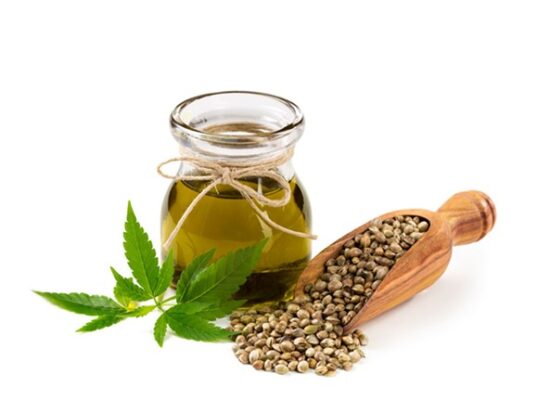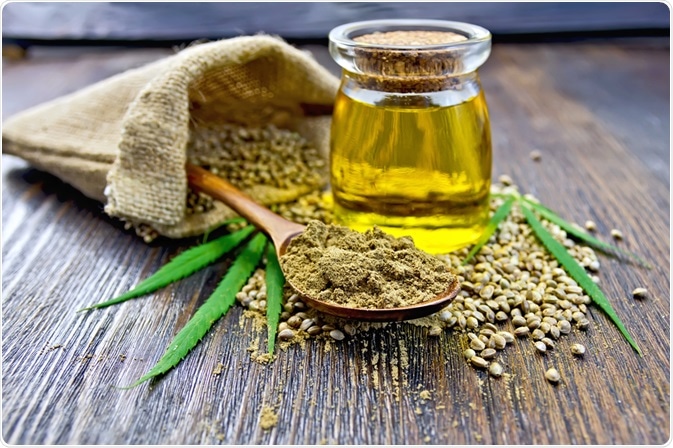Hemp (Cannabis sativa L) has been cultivated for its fiber and oil for many centuries. Due to its versatility, the oil has been used to create several household items such as detergents and soaps. Its usability also extends to human consumption due to its many nutritional and health benefits.
 May aid in a number of areas including:
May aid in a number of areas including:
- Soothing sunburns
- Clean pores and may help reduce acne
- Easing the effects of burns
- Reducing the signs of stretch marks
- Nourishing damaged skin
- Reducing dry skin, including scaling and cracking
- Diminish wrinkles, while slowing the signs of aging
- Even helping with the dryness from psoriasis and eczema
What is hemp oil?
Hemp seed is renowned for its nutritional and general health benefits and is composed of protein, carbohydrates, and fiber. Benefits of hemp seed oil relate to its 3:1 ratio of two essential polyunsaturated fatty acids: linoleic (LA) and a-linolenic acid (LNA). These polyunsaturated fatty acids are especially beneficial to the heart.
Can hemp oil benefit skin?
Due to hemp oil’s composition and the addition of gamma-linolenic acid (GLA) to formulations, the oil is included in body oils and lipid-enriched creams that are designed to penetrate into the skin. The oil provides good skin moisturization.
Furthermore, oil has been found to be beneficial in the treatment of specific skin conditions including eczema, dermatitis, psoriasis, and acne rosacea. Favorable results likely relate to the GLA component of hemp oil. In addition to moisturizing, the oil is also used to relieve discomfort associated with itchy skin. Other benefits may include skin strengthening, which enhances the skin’s role in resisting viral, fungal, and bacterial infections.
Hemp oil as a source of healthy fats
Healthy fats are those which contain polyunsaturated and monounsaturated fats. Due to hemp oil’s high concentration of GLA, regular consuming may be helpful for those who do not eat fish or eggs to reach their recommended daily intake of healthy fat. Research has found that having a diet high in healthy fats can improve sensitivity to insulin and stabilize heart rhythm.
Anti-cancer properties of hemp oil
Cannabinoids (CBD) have been used to manage symptoms in patients with cancer and are present in small amounts in hemp seed oil. One study showed that cannabinoid extracts inhibited the growth of lung adenocarcinoma cells. Further tests have demonstrated antiproliferative, proapoptotic, and antiangiogenic effects of CBD on breast, prostate, and skin malignancies. However, it is important to note that other studies have found that cannabinoids may also stimulate tumor growth.
Weight regulation
Hemp oil is thought to be high in dietary fiber, the edible part of a plant that is not digested or absorbed by the small intestine. Studies have shown that frequent consumption of fiber is associated with improved weight control.
Can help oil help lower cholesterol levels?
One area that has been researched extensively is the use of hemp oil to treat cardiovascular conditions because of the balance of omega-3 and omega-6 fatty acids. Like other unsaponifiable vegetable oils (eg, rapeseed and soybean oils), hemp oil appears to be effective in lowering cholesterol levels due to the β-sitosterols present.
Is hemp oil safe?
When used topically, some people may experience mild irritation from hemp oil. It is therefore suggested that people wishing to use hemp oil on skin first test the oil on a small area of skin (patch test).
Oral consumption of hemp oil may lead to the development of digestive problems due to its high-fat content. To avoid this side effect, only small amounts should be consumed at first. Research has also shown that the oil can interact with blood thinners. Thus, it is important to seek medical advice before consuming hemp oil to ensure that there are no contraindications or possible drug interaction risks.
There are many potential health benefits to using hemp oil for topical treatment of skin conditions and to lowering cholesterol. However, more research is needed regarding its effect on tumor growth and its interaction with commonly used medications.

